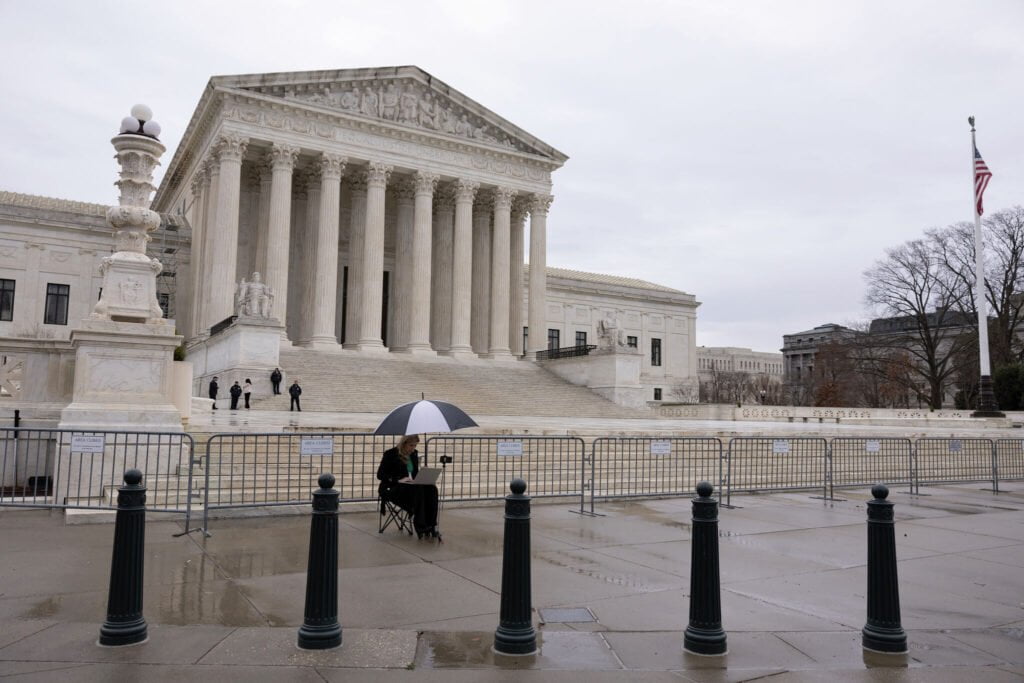The Supreme Court this week held a hearing that will decide the fate of the Biden Administration’s promise to forgive millions of Americans up to $20,000 in student loan debt – a plan that could cost as much as $400 billion.
In a three-hour session held Tuesday, Supreme Court Justices heard arguments from the Biden Administration and six GOP states involved in challenges against the plan. The six states are: Arkansas, Iowa, Kansas, Missouri Nebraska, and South Carolina.
Plaintiffs are largely backed by the court’s conservative majority, whereas the Biden Administration has support from the court’s three liberal justices.
Major arguments in favor of moving forward with the debt relief plan:
- States do not have legal grounds to sue because they cannot show actual harm or injury resulting from the program.
- Student loan payments were paused in March of 2020 and nobody sued over that decision.
- The federal government helped small businesses during the pandemic; why can’t it help students?
US Solicitor General Elizabeth Prelogar claims the Biden Administration’s debt forgiveness plan is legal under the Higher Education Relief Opportunities for Students Act of 2023 (HEROES Act), a law that was intended to benefit service members deployed to Afghanistan and Iraq by providing debt relief. ‘The language of the HEROES Act clearly grants the Secretary of Education the power to waive or modify federal student loan programs as deemed necessary in connection with a war or other military operation or national emergency,’ she said.
Prelogar went on to insist that lawmakers knew the HEROES Act could be used to forgive massive amounts of student debt when they approved it (a claim disputed by the opposition) and said that any action by SCOTUS to invalidate the plan would throw into question the federal government’s ability to protect Americans during a national emergency.
Major arguments against the debt relief plan:
- It’s too expensive. The plan will increase the national deficit and burden the poor and working class with taxes.
- It’s not fair. The plan will take taxpayer funds from individuals who never went to college or who paid off their loans in order to forgive the loans of others.
- It’s not legal. The plan supersedes the appropriations authority granted to Congress and violates the separation of powers doctrine the Supreme Court is supposed to uphold.
At least five of the court’s six conservative justices backed the opinion that use of the HEROES Act to cancel student debt violates the court’s 2022 “major questions doctrine,” which holds that an agency can’t make decisions of “vast economic or political significance” unless granted authority from Congress.
“If you’re talking about this in the abstract, I think most casual observers would say, if you’re going to give up that much amount of money, if you’re going to affect the obligations of that many Americans on a subject that’s of great controversy, they would think that’s something for Congress to act on,” said Chief Justice John Roberts.
Roberts took particular issue with Prelogar’s attention to the phrase “waive or modify” in relation to the use of the HEROES Act to cancel student debt. “It might be good English to say that the French Revolution ‘modified’ the status of the French nobility, but only because there is a figure of speech called understatement and a literary device known as sarcasm,” he said. “We’re talking about half a trillion dollars and 43 million Americans…How does that fit under the normal understanding of ‘modify?’”
The primary concern for plaintiffs from Missouri is the potential financial impact on the Higher Education Loan Authority of the State of Missouri (MOHELA), one of the nation’s largest holders and servicers of student loans.
Surprisingly, Trump-appointed Justice Amy Coney Barrett joined her liberal colleagues in arguing that MOHELA’s financial debts are not so intertwined with the state that it can sue on the company’s behalf. “If MOHELA is an arm of the state, why didn’t you just strong-arm MOHELA and say you’ve got to pursue this suit?” asked Barrett.
The Supreme Court will spend the next few months debating the issue before producing an opinion (hopefully a draft won’t be leaked to the press this time around). A final ruling is expected to be made public by June. As it stands, the pandemic repayment pause initiated in March of 2020 will end 60 days after the Supreme Court announces its decision.
Sources:
Top takeaways from student loan forgiveness arguments at the Supreme Court
Six States File a Challenge to the Biden Administration’s Student Loan Cancellation Program
Randi Weingarten screams about student debt outside SCOTUS: ‘That is not fair!’
